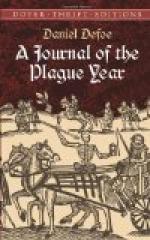When I speak of rows of houses being shut up, I do not mean shut up by the magistrates, but that great numbers of persons followed the Court, by the necessity of their employments and other dependences; and as others retired, really frighted with the distemper, it was a mere desolating of some of the streets. But the fright was not yet near so great in the city, abstractly so called, and particularly because, though they were at first in a most inexpressible consternation, yet as I have observed that the distemper intermitted often at first, so they were, as it were, alarmed and unalarmed again, and this several times, till it began to be familiar to them; and that even when it appeared violent, yet seeing it did not presently spread into the city, or the east and south parts, the people began to take courage, and to be, as I may say, a little hardened. It is true a vast many people fled, as I have observed, yet they were chiefly from the west end of the town, and from that we call the heart of the city: that is to say, among the wealthiest of the people, and such people as were unencumbered with trades and business. But of the rest, the generality stayed, and seemed to abide the worst; so that in the place we calf the Liberties, and in the suburbs, in Southwark, and in the east part, such as Wapping, Ratcliff, Stepney, Rotherhithe, and the like, the people generally stayed, except here and there a few wealthy families, who, as above, did not depend upon their business.
It must not be forgot here that the city and suburbs were prodigiously full of people at the time of this visitation, I mean at the time that it began; for though I have lived to see a further increase, and mighty throngs of people settling in London more than ever, yet we had always a notion that the numbers of people which, the wars being over, the armies disbanded, and the royal family and the monarchy being restored, had flocked to London to settle in business, or to depend upon and attend the Court for rewards of services, preferments, and the like, was such that the town was computed to have in it above a hundred thousand people more than ever it held before; nay, some took upon them to say it had twice as many, because all the ruined families of the royal party flocked hither. All the old soldiers set up trades here, and abundance of families settled here. Again, the Court brought with them a great flux of pride, and new fashions. All people were grown gay and luxurious, and the joy of the Restoration had brought a vast many families to London.
I often thought that as Jerusalem was besieged by the Romans when the Jews were assembled together to celebrate the Passover—by which means an incredible number of people were surprised there who would otherwise have been in other countries—so the plague entered London when an incredible increase of people had happened occasionally, by the particular circumstances above-named. As this conflux of the people to a youthful and gay Court made a great




